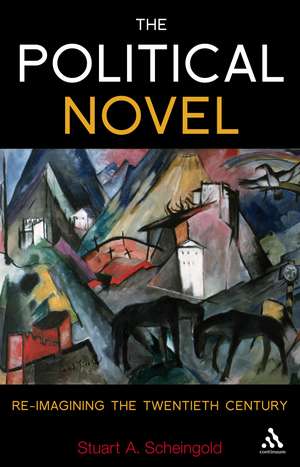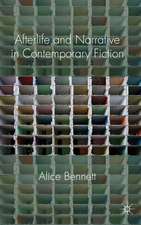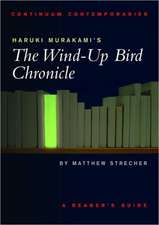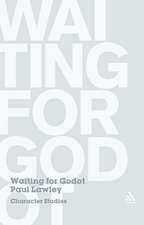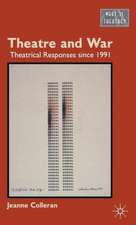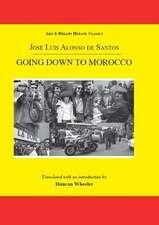The Political Novel: Re-Imagining the Twentieth Century
Autor Professor Stuart A. Scheingolden Limba Engleză Paperback – 15 sep 2010
Preț: 224.11 lei
Preț vechi: 257.97 lei
-13% Nou
Puncte Express: 336
Preț estimativ în valută:
42.88€ • 44.89$ • 35.48£
42.88€ • 44.89$ • 35.48£
Carte tipărită la comandă
Livrare economică 05-19 aprilie
Preluare comenzi: 021 569.72.76
Specificații
ISBN-13: 9781441176394
ISBN-10: 144117639X
Pagini: 272
Dimensiuni: 138 x 216 x 18 mm
Greutate: 0.34 kg
Editura: Bloomsbury Publishing
Colecția Continuum
Locul publicării:New York, United States
ISBN-10: 144117639X
Pagini: 272
Dimensiuni: 138 x 216 x 18 mm
Greutate: 0.34 kg
Editura: Bloomsbury Publishing
Colecția Continuum
Locul publicării:New York, United States
Caracteristici
Reveals how political novels contribute to the collective memory of the 20th century
Cuprins
Preface1. Novels of Political Estrangement: Subversion of Agency in the Twentieth Century2. Anti-War Novels in the 20th Century: The Road to Late Modernity3. The Alchemy of Catastrophe: Seeking Spiritual Solace in the Ashes of the Holocaust 4. Aftermath of Disaster: The Nazi Legacy 5. The Contradictions of Democracy: Political Estrangement in the U.S. and the U.K. 6. Re-Imagining the 20th Century, Remembering the 21st Notes BibliographyIndex
Recenzii
"This is a wonderful read. Indeed once I started the book I could not put it down. It is wonderful to see a sophisticated argument about the nature of modern politics played out through close readings of fiction. Scheingold shows how the political novel traces a trajectory of political estrangement and a loss of political agency in the face of the horrors of twentieth century life. He offers readers a new way of seeing the condition of modern politics even as he also shows the value of literature as a vehicle for developing that way of seeing. This book will bring students of politics to literature and students of literature to politics. It is a cross disciplinary gem." -- Austin Sarat, William Nelson Cromwell Professor of Jurisprudence and Political Science, Amherst College, USA, and Editor of Studies in Law, Politics, and Society
"This book addresses the many European and American writers whose novels document the horrific consequences of politics "gone bad" in the twentieth century. Whereas many media pundits and social scientists routinely hail the advances of modern liberal democracy over the last century, Scheingold's book deals with the horrors of war, genocide, dictatorship, imperialism, and the like imposed by failed politics on ordinary people, as constructed in the "bottom-up" fictional stories of great novelists. His book adds up to a powerful challenge on big political questions that empirical political scientists and many other types of scholars routinely evade." Michael McCann, Gordon Hirabayashi Professor for the Advancement of Citizenship at the University of Washington
"In the very best tradition of interdisciplinary inquiry, Stuart Scheingold re-imagines the collective catastrophe of the twentieth century, offering fresh insights into the destabilization of democracies, the rise of totalitarianism, and-importantly, for both understanding our histories and anticipating our futures-our shaken faith in the promise of modernity. Deftly shifting between and among political, cultural, historical, and literary approaches to novels of political estrangement by some of the twentieth-century's most important authors, Scheingold illuminates the impact of political processes and shifting images of political agency on ordinary people, as well as the critical importance of the literary imagination for political inquiry itself." -- Bill Lyons, Professor of Political Science, University of Akron, USA
"I believe that Scheingold is the only one who could have written this book. He reads political novels with more insight into and sophistication about the way fiction works than anyone else has. The book is the product of long-term study and thinking, and I am happy to recommend it with great, great enthusiasm." -- Malcolm A. Griffith, Emeritus in English, The University of Washington, USA
"This book is a worthy successor to Irving Howe's 1957 classic, Politics and the Novel. Howe looked back to assess the politics of modernity that culminated in the mid-twentieth century. Here renowned cultural critic Stuart Scheingold assesses the post-modern condition through the lenses of literature. It is a tour de force. As in so much of his writing, Scheingold is well-ahead of the curve. Readers of the New York Review of Books and other publications which value serious intellectual inquiry will find this study fascinating." -- Malcolm M. Feeley, Claire Sanders Clements Dean's Professor, Jurisprudence and Social Policy Program, School of Law, University of California at Berkeley, USA
"In this insightful, urgent and beautifully constructed book, Stuart Scheingold argues that the literary imagination is distinctively revealing in its analysis of politics. As Scheingold shows, literature, more than social science, has provided comprehensive documentation of the failure of the modernist project of progress over the 20th century, as the promise of democracy turned into the reality of mass manipulation, as the narrative of social betterment turned into the reality of political destruction, and as the goal of peace repeatedly turned into the reality of war. Fiction reminds us of the detritus of politics. After reading this book, it is impossible to believe that social scientists should ever do their work without taking on board the insights of literature and that literary critics should ever forget the worlds-and the people-that their texts help us all to understand." -- Kim Lane Scheppele, Laurance S. Rockefeller Professor of Sociology and Public Affairs, Princeton University, USA
"Whilst the impelling concern of this unique and eloquent tour d'horizon is with novels of political estrangement, and even as a searing insight is brought to bear on them, the intense focus on what denies modern political agency also intimates what may yet fulfil it. And although that promise may lack the compelling cognates of estrangement, Scheingold's poignant evocations of the literary still give insistent voice to the possibility of fulfilment, to an inexhaustible hope." -- Peter Fitzpatrick, Anniversary Professor of Law, Birkbeck, University of London, UK
"One of the great problems of our age-the decline in political engagement-comes alive in this sobering exploration of modern literature. Demonstrating the loss of agency and of hope and commitment portrayed in novels of many nations, The Political Novel helps us understand the past century and maybe the one ahead." -- James N. Gregory, the Harry Bridges Endowed Chair of Labor Studies and Professor of History, the University of Washington, USA
"This book addresses the many European and American writers whose novels document the horrific consequences of politics "gone bad" in the twentieth century. Whereas many media pundits and social scientists routinely hail the advances of modern liberal democracy over the last century, Scheingold's book deals with the horrors of war, genocide, dictatorship, imperialism, and the like imposed by failed politics on ordinary people, as constructed in the "bottom-up" fictional stories of great novelists. His book adds up to a powerful challenge on big political questions that empirical political scientists and many other types of scholars routinely evade." Michael McCann, Gordon Hirabayashi Professor for the Advancement of Citizenship at the University of Washington
"In the very best tradition of interdisciplinary inquiry, Stuart Scheingold re-imagines the collective catastrophe of the twentieth century, offering fresh insights into the destabilization of democracies, the rise of totalitarianism, and-importantly, for both understanding our histories and anticipating our futures-our shaken faith in the promise of modernity. Deftly shifting between and among political, cultural, historical, and literary approaches to novels of political estrangement by some of the twentieth-century's most important authors, Scheingold illuminates the impact of political processes and shifting images of political agency on ordinary people, as well as the critical importance of the literary imagination for political inquiry itself." -- Bill Lyons, Professor of Political Science, University of Akron, USA
"I believe that Scheingold is the only one who could have written this book. He reads political novels with more insight into and sophistication about the way fiction works than anyone else has. The book is the product of long-term study and thinking, and I am happy to recommend it with great, great enthusiasm." -- Malcolm A. Griffith, Emeritus in English, The University of Washington, USA
"This book is a worthy successor to Irving Howe's 1957 classic, Politics and the Novel. Howe looked back to assess the politics of modernity that culminated in the mid-twentieth century. Here renowned cultural critic Stuart Scheingold assesses the post-modern condition through the lenses of literature. It is a tour de force. As in so much of his writing, Scheingold is well-ahead of the curve. Readers of the New York Review of Books and other publications which value serious intellectual inquiry will find this study fascinating." -- Malcolm M. Feeley, Claire Sanders Clements Dean's Professor, Jurisprudence and Social Policy Program, School of Law, University of California at Berkeley, USA
"In this insightful, urgent and beautifully constructed book, Stuart Scheingold argues that the literary imagination is distinctively revealing in its analysis of politics. As Scheingold shows, literature, more than social science, has provided comprehensive documentation of the failure of the modernist project of progress over the 20th century, as the promise of democracy turned into the reality of mass manipulation, as the narrative of social betterment turned into the reality of political destruction, and as the goal of peace repeatedly turned into the reality of war. Fiction reminds us of the detritus of politics. After reading this book, it is impossible to believe that social scientists should ever do their work without taking on board the insights of literature and that literary critics should ever forget the worlds-and the people-that their texts help us all to understand." -- Kim Lane Scheppele, Laurance S. Rockefeller Professor of Sociology and Public Affairs, Princeton University, USA
"Whilst the impelling concern of this unique and eloquent tour d'horizon is with novels of political estrangement, and even as a searing insight is brought to bear on them, the intense focus on what denies modern political agency also intimates what may yet fulfil it. And although that promise may lack the compelling cognates of estrangement, Scheingold's poignant evocations of the literary still give insistent voice to the possibility of fulfilment, to an inexhaustible hope." -- Peter Fitzpatrick, Anniversary Professor of Law, Birkbeck, University of London, UK
"One of the great problems of our age-the decline in political engagement-comes alive in this sobering exploration of modern literature. Demonstrating the loss of agency and of hope and commitment portrayed in novels of many nations, The Political Novel helps us understand the past century and maybe the one ahead." -- James N. Gregory, the Harry Bridges Endowed Chair of Labor Studies and Professor of History, the University of Washington, USA
